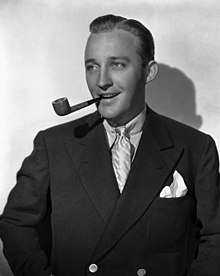
Back Бінг Kросбі ADY Bing Crosby Afrikaans ቢንግ ክሮስቢ Amharic Bing Crosby AN Bing Crosby ANG بينغ كروسبي Arabic بنج كروسبى ARZ বিং ক্ৰাজবি Assamese Bing Crosby AST Binq Krosbi Azerbaijani
Bing Crosby | |
|---|---|
 Crosby c. 1940 | |
| Born | Harry Lillis Crosby Jr. May 3, 1903 Tacoma, Washington, U.S. |
| Died | October 14, 1977 (aged 74) Alcobendas, Spain |
| Resting place | Holy Cross Cemetery, Culver City, California, U.S. |
| Alma mater | Gonzaga University |
| Occupations |
|
| Years active | 1923–1977 |
| Works | |
| Spouses | |
| Children | |
| Relatives |
|
| Musical career | |
| Genres | |
| Labels | |
| Website | bingcrosby |
| Signature | |
 | |
Harry Lillis "Bing" Crosby Jr. (May 3, 1903 – October 14, 1977) was an American singer and actor. The first multimedia star, he was one of the most popular and influential musical artists of the 20th century worldwide.[1] Crosby was a leader in record sales, network radio ratings, and motion picture grosses from 1926 to 1977. He was one of the first global cultural icons.[2] Crosby made over 70 feature films and recorded more than 1,600 songs.[3][4][5]
Crosby's early career coincided with recording innovations that allowed him to develop an intimate singing style that influenced many male singers who followed, such as Frank Sinatra,[6] Perry Como, Dean Martin, Dick Haymes, Elvis Presley, and John Lennon.[7] Yank magazine said that Crosby was "the person who had done the most for the morale of overseas servicemen" during World War II.[8] In 1948, American polls declared him the "most admired man alive", ahead of Jackie Robinson and Pope Pius XII.[3]: 6 [9] In 1948, Music Digest estimated that Crosby's recordings filled more than half of the 80,000 weekly hours allocated to recorded radio music in America.[9]
Crosby won the Academy Award for Best Actor for his performance in Going My Way (1944) and was nominated for its sequel, The Bells of St. Mary's (1945), opposite Ingrid Bergman, becoming the first of six actors to be nominated twice for playing the same character. Crosby was the number one box office attraction for five consecutive years from 1944 to 1948.[10] At his screen apex in 1946, Crosby starred in three of the year's five highest-grossing films: The Bells of St. Mary's, Blue Skies, and Road to Utopia.[10] In 1963, he received the first Grammy Global Achievement Award.[11] Crosby is one of 33 people to have three stars on the Hollywood Walk of Fame,[12] in the categories of motion pictures, radio, and audio recording.[13] He was also known for his collaborations with his friend Bob Hope, starring in the Road to ... films from 1940 to 1962.
Crosby influenced the development of the post–World War II recording industry. After seeing a demonstration of a German broadcast quality reel-to-reel tape recorder brought to the United States by John T. Mullin, Crosby invested $50,000 in the California electronics company Ampex to build copies. He then persuaded ABC to allow him to tape his shows and became the first performer to prerecord his radio shows and master his commercial recordings onto magnetic tape. Crosby has been associated with the Christmas season since he starred in Irving Berlin's musical film Holiday Inn and also sang "White Christmas" in the film of the same name. Through audio recordings, Crosby produced his radio programs with the same directorial tools and craftsmanship (editing, retaking, rehearsal, time shifting) used in motion picture production, a practice that became the industry standard.[14] In addition to his work with early audio tape recording, Crosby helped finance the development of videotape, bought television stations, bred racehorses, and co-owned the Pittsburgh Pirates baseball team, during which time the team won two World Series (1960 and 1971).
- ^ Communications, Museum of Broadcast (2004). The Museum of Broadcast Communications Encyclopedia of Radio. Fitzroy Dearborn. ISBN 978-1-57958-431-3.
- ^ Prigozy, Ruth; Raubicheck, Walter (2007). Going My Way: Bing Crosby and American Culture. University Rochester Press. ISBN 978-1-58046-261-7.
- ^ a b Giddins, Gary (2001). Bing Crosby: A Pocketful of Dreams (1 ed.). Little, Brown. pp. 30–31. ISBN 0-316-88188-0.
- ^ "Bing Crosby – Hollywood Star Walk". Los Angeles Times.
- ^ Young, Larry (October 15, 1977). "Bing Crosby dies of heart attack". Spokesman-Review. p. 1.
- ^ Gilliland 1994, cassette 1 side B.
- ^ Giddins, Gary (January 28, 2001). "MUSIC; Bing Crosby, The Unsung King of Song". The New York Times. ISSN 0362-4331. Retrieved May 27, 2020.
- ^ Giddins, Gary (2018). Bing Crosby – Swinging on a Star – The War Years 1940–1946. New York: Little, Brown & Co. p. 546. ISBN 978-0-316-88792-2.
- ^ a b Hoffman, Frank. "Crooner". Archived from the original on March 11, 2007. Retrieved December 29, 2006.
- ^ a b Stanley, Bob, Let's Do It: The Birth of Pop Music, Pegasus Books, 2022, pg. 220
- ^ Tapley, Krostopher (December 10, 2015). "Sylvester Stallone Could Join Exclusive Oscar Company with 'Creed' Nomination". Variety. Retrieved February 29, 2016.
- ^ "Hollywood Star Walk". Projects.latimes.com.
- ^ "Bing Crosby". Hollywood Walk of Fame. October 25, 2019.
- ^ "Engineering and Technology History Wiki". Ethw.org. Retrieved January 19, 2019.